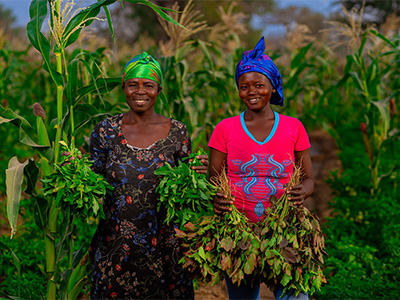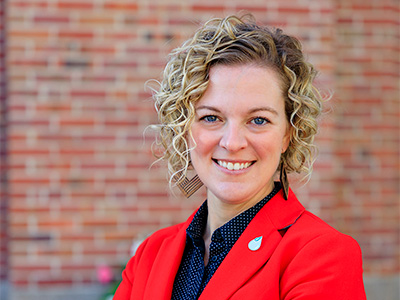Lincoln, Nebraska, U.S.A. — The U.S. Agency for International Development (USAID) has selected the Daugherty Water for Food Global Institute (DWFI) at the University of Nebraska to lead its new Feed the Future Innovation Lab for Irrigation and Mechanization Systems (ILIMS). The award was announced at the World Food Prize Borlaug Dialogue event in Des Moines, Iowa by Dina Esposito, the Assistant to the Administrator for the Bureau for Resilience, Environment, and Food Security (REFS) at USAID.

“Feed the Future Innovation Labs are driving novel solutions to the increasingly complex challenges we face today,” said Dina Esposito, Feed the Future Deputy Coordinator and USAID’s Assistant to the Administrator for Resilience, Environment, and Food Security. “Advancing this research is key to equipping small-scale farmers with the tools they need to boost yields, use resources more efficiently and be more resilient to shocks.”
The Innovation Lab will generate research-based evidence to support the growth of vibrant irrigation and mechanization markets, develop strong institutions and local capacity for their sustainability, and foster opportunities for equitable access in Feed the Future focal countries. The $19 million core fund is provided over a five-year term with a potential extension to an overall ceiling of $40 million.
Despite the development of many technologies, irrigation and use of agricultural equipment remains extremely low in most low- and middle-income countries. This is especially true for smallholder producers, including women, youth, and other marginalized groups. To address this, the Innovation Lab will conduct research to catalyze increased irrigated and mechanized production in an economically and environmentally sustainable way. The results will contribute to the U.S. Government’s Global Food Security Strategy’s objectives, which include inclusive and sustainable agriculture-led economic growth, improved resilience and better nutrition.
“Water use in agriculture is a global priority, as well as in Nebraska and the U.S. This Innovation Lab will work to improve global food security through science, technology and innovation by using the expertise and research capacity of DWFI, the University of Nebraska and our research partner consortium,” said Nicole Lefore, director of the Innovation Lab and DWFI Associate Director of Sustainable Agriculture Water Management.
With more than 13 years of experience in the areas of global food and water security and its extensive international networks, DWFI is well positioned to lead the project. The Innovation Lab will be supported by the University of Nebraska and its deep bench of faculty expertise.
“Throughout its history, the University of Nebraska-Lincoln’s Institute of Agriculture and Natural Resources has focused on meeting producers where they are and collaborating to improve yield, profitability and resilience,” said Mike Boehm, NU vice president and Harlan Vice Chancellor for UNL’s Institute of Agriculture and Natural Resources. “The Daugherty Water for Food Global Institute is the piece of UNL that expands this important work and works with producers far beyond Nebraska. DWFI’s work is global, scalable and incredibly producer-focused. DWFI is a wonderful fit for this project, and I’m eager to see this work benefit producers and bolster food security.”
Research will develop innovations in irrigation and agricultural equipment suitable to developing countries, improved water governance and climate adaptation and mitigation, and strong market and finance systems for agricultural equipment. Learning from Nebraska and the U.S., the project will also strengthen approaches to protect water for improved nutrition and health. Across all activities, DWFI will integrate training and capacity development to support future water and agricultural leaders in science and practice.
The Innovation Lab will accelerate the impact of innovations through close engagement with stakeholder networks including leading research institutions, development organizations and industry. Early focus countries for the project include Nepal, Ethiopia, Rwanda, Ghana, Honduras and Guatemala, as well as the East and Southern Africa regions.
Feed the Future investments in global research led by U.S. land-grant universities such as University of Nebraska, bring major returns to U.S. farmers and consumers through scientific innovations in crop and food systems and better coordination of scarce natural resources. The programs also strengthen farmer resilience to shocks and enable countries to mitigate and respond to crises, reducing the need for emergency assistance.
“This is an especially significant investment in securing water and increasing productivity in small-holder agriculture around the world and, along with our partners, delivering on our mission of a water and food secure world,” said DWFI Executive Director Peter McCornick.
The Innovation Lab for Irrigation and Mechanization Systems is one of more than 17 Feed the Future Innovation Labs led by U.S. universities and funded by USAID that work on food security and nutrition challenges with local researchers and institutions in the Agency’s partner countries.
###
About the Daugherty Water for Food Global Institute
The Daugherty Water for Food Global Institute at the University of Nebraska was founded in 2010 to address the global challenge of achieving food security with less stress on water resources by conducting scientific and policy research, using the results to inform and advise policymakers, and educating future water for food leaders. Learn more at waterforfood.nebraska.edu.
About Feed the Future
Feed the Future is America's initiative to combat global hunger and poverty. It brings partners together to help some of the world’s poorest countries harness the power of agriculture and
entrepreneurship to jumpstart their economies and create new opportunities. For more information, visit feedthefuture.gov.


